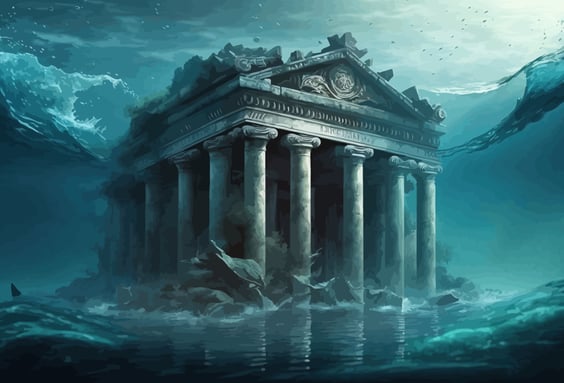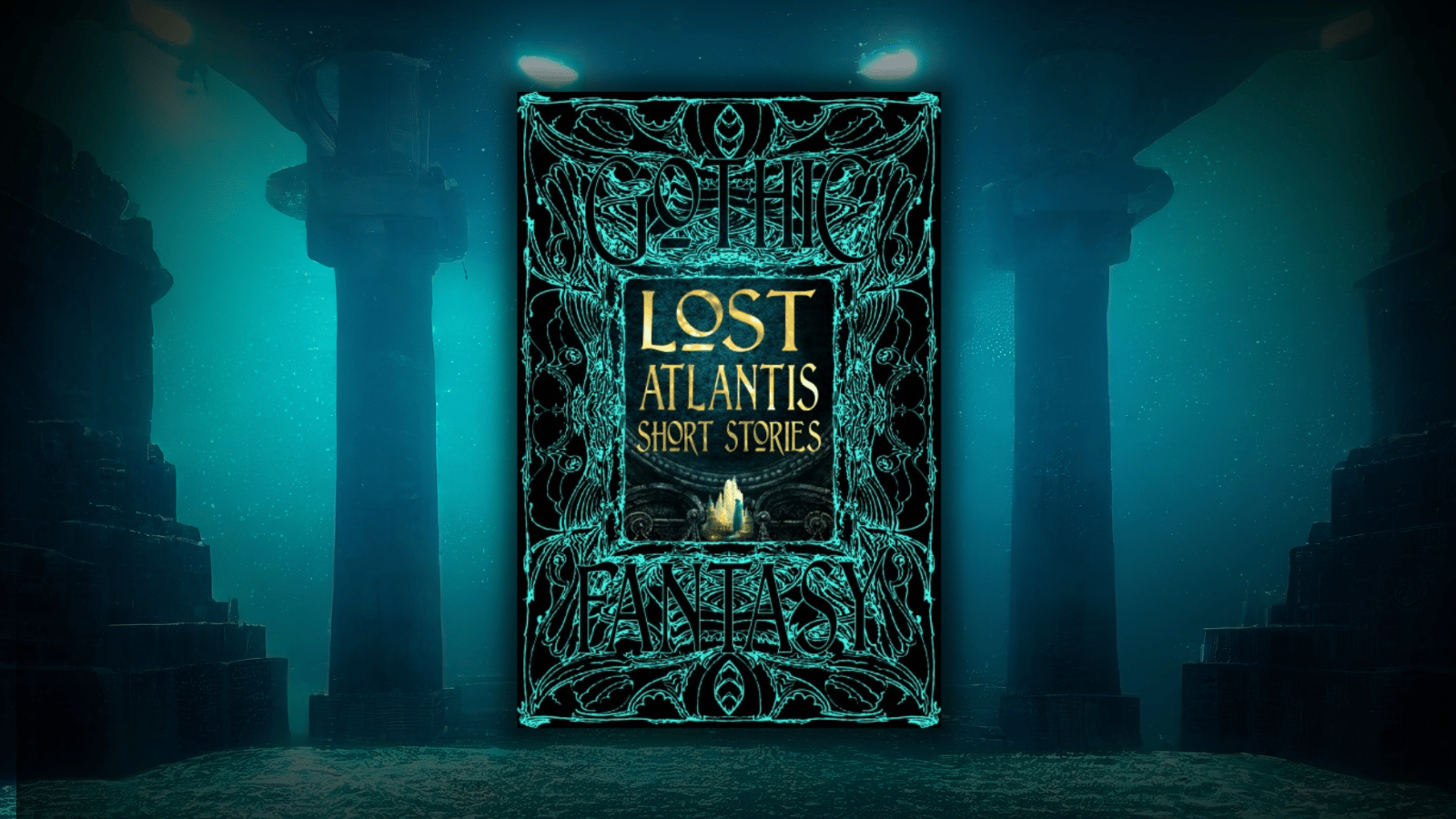Lost Atlantis Short Stories is one of our newest anthologies, and we’re celebrating its release with a Q&A with the book’s modern authors! Taking Plato’s famous allegory as its starting point, the collection gathers together classic and new stories exploring not just the fabled Atlantis, but the concept of lost places, hidden societies and remote or submerged lands. Here to give a taster of what their story is about, some of the authors discuss the fascination inspirations behind their contribution…

What was the inspiration behind your story in this anthology?
Ash Arya – A Promise in Bronze
I’ve been an Indus Valley geek for quite a while now. So, when I saw Flame Tree’s call for submission, I instantly wanted to write a piece centering this ancient civilization with all its quaint features, and my favorite artifact from it. Looking at the Dancing Girl seal, I’ve often wondered, could there have been a moment that inspired this? No way to tell, yet. So, I created a moment.
Rose Beardmore – Aging Ivy, Absent Sister
This story was inspired by a series of minor characters in Romeo and Juliet (namely Tybalt and Mercutio). In this version, the setting is a post-apocalyptic Verona, and all the characters are queer and female-identifying. So I guess you could say the source material is Shakespearean, but the adaptation is drawn from my own lived experience.
Leah Cypess – Across the River
My fascination with stories about the land beyond the Sambatyon River started when I was a child. Then, a few years ago, I heard a lecture about the specific myth I retold here – the tale of Rabbi Meir, author of the Akdamot, a liturgical poem read by Ashkenazi Jews during the holiday of Shavuot. The Akdamot is a beautiful poem that I have always loved, and the combination of the two spurred me to seriously attempt a retelling.
Deborah L. Davitt – Under Hill, Under Dale
Sometimes my stories come together as an argument against something else I’ve read or watched. My story this time around is exactly that – an argument against a Marvel property that holds as its inherent belief the notion that a society that exists in isolation will excel, exceeding other societies in terms of its advancement. Societies that are isolated, from ancient Sparta to modern North Korea, stagnate. It’s in communication, in coming together, the clash of ideas being tested against each other, that social and scientific advancements are made.
Tracy Fahey – Asylum
This short story, ‘Asylum’, was based on my last two years of research into the Hag archetype in Irish mythology – the Hag or Cailleach is a pivotal and powerful female figure who strides the land like a colossus, dropping stones from her apron that become islands, caring for the land, and anointing kings. My recent novella, They Shut Me Up (PS Publishing, 2023), and a body of stories I’ve accumulated about the Hag, all speak to the ancient power of the older woman, and how it might translate into this contemporary age where menopause often signals invisibility. In ‘Asylum’ I wanted to look at the power of the bean ghluine (the midwife), often seen as the spiritual descendant of the Hag, and, like her, with a special connection to the Irish fairies, na Sidhe, and their occulted Otherworld. ‘Asylum’ is a narrative about older women transmitting agency and solace to younger women, rendered more poignant by the fate of the protagonist, already in exile from her homeland. I’m particularly indebted to my neighbours Ali and Douma Alabbas, who shared with me their experience of travelling from Syria to Ireland. I wanted to highlight the difficulties and endless bureaucracy of such voyages in contemporary culture, and link them with the mythic voyages between worlds that the fae inhabit.
Isobel Granby – The Exiles
I wasn’t thinking about Atlantis initially, but instead, of friendships gone wrong and loyalties that cause suffering. The characters started the story – none of them can go back to what was, but they cannot quite see it – and so the setting had to be something once beautiful, that had crumbled into something dangerous and alluring in its ruin. Later I ended up co-writing a comedic take on Ys but that was a coincidence!
John Linwood Grant – The Cities We Once Knew
I’ve always been interested in the truth behind the explorers who were once so celebrated for their expeditions into – to them – unknown lands, lands which were of course already known by their own indigenous people. Did they seek knowledge, wealth or simply fame, and were they so ‘heroic’ as they were portrayed? The fate of the real-life Percy Fawcett, who disappeared in 1925, has never been established, nor has his impact on those he encountered…
David Hankins – Where the Lost Things Are
‘Where the Lost Things Are’ was inspired by a song in Mary Poppins Returns. I wondered what it would be like in the place where the lost things go and the science behind getting intentionally lost in order to reach that Lost Dimension. I threw in Schrödinger’s cat, and everything suddenly made sense and the story was born.
M.K. Hutchins – The Temple’s Posthole
I love postholes in an archaeological context. There is something wondrous about patterns in the soil revealing where posts once stood, outlining a building even if nothing remains of it. Developing a magic system around postholes felt natural.
Silas Leavitt – All the Time in the World
‘All the Time in the World’ started as a day-dream, a vision of Aleph dancing back and forth in the sundial, capturing Time. Most of my writing starts that way. I imagine scenes, specific lines that grab me, and then I go back and fill in the details. Not everything survives being a flight of fancy, but I am so happy this one did.
Kwame M.A. McPherson – The City of Warrior Queens
I enjoy history, everything about those stories that have gone before, and thus tried to tell a tale where there are different elements, such as having a city with only women fighters which is akin to the story of the Dahomey Amazon warriors.
Damien Mckeating – Waters of Avalon
‘Waters of Avalon’ was a coming together of a couple of ideas. One was the children that I work with, talking to their families, and seeing some of the challenges they were facing and emotions they were processing. This became entwined with the tragedy and nobility of creating a better world that you never get to see, and I was thinking of soldiers who return from war and struggle to reintegrate into civilian life. What if you could create heaven for your child, but never get to see it?
John Moralee – Forgotten
A Blue Planet documentary showed the damage done to the polar ice caps by climate change, which made me wonder what could be revealed, hidden under the surface, when that ice melts. For thousands of years the ice has preserved the history of our planet like a time capsule, but it could soon vanish. Anything could be frozen in there, including a lost civilisation.
Barry Neenan – Scavengers
I had been dabbling in cosmic horror when I saw the prompt, so I knew which side of the utopia/dystopia divide ‘Scavengers’ would aim for. As a genre that benefits from leaving big questions unanswered, it’s a natural fit for short stories where space is tight. I could focus my efforts on atmosphere instead of backstory. Sharp-eyed readers might deduce which mythos I was thinking of – ‘Asoc-Rac’ is a working title that stuck!
Erica Ruppert – To Selareme
‘To Selareme’ actually began as a long, narrative, and not-so-good poem I wrote when I was in my teens. I liked the basic premise and eventually got around to rewriting it as prose. The division between city-dweller and nomad has stayed essentially the same since I first imagined it, but the characters became radically different. Their world-views and sense of self changed considerably when I revisited the story as an adult, and they now show the influence of current social and political trends.
C.R. Serajeddini – Issa and the Gryphon
Issa and the Gryphon is my retelling of the Persian legend of Zal – or Dastan – the albino boy who was rejected and left atop Mount Alborz – the highest peak in Iran – because of what he looked like when he was born. Persian and Mesopotamian culture and history are rich with beautiful stories, and Zal’s story is one I’ve always been fascinated by.
Zach Shephard – The Tower Calls
‘The Tower Calls’ was written as a love-letter to my partner at the time, inspired not just by a number of the memories we’d created, but also our planned trip to the Dice Tower West game convention the following spring. We never did make it to Vegas, but I’m glad I wrote the story when I did, so I can always remember how things were.
Calie Voorhis – The Librarian’s Secret Society, 1988
I started theorizing about ways advanced cultures could retain their knowledge across generations and came up with the idea of a genetic library – it could only be accessed by someone if they read enough books. And then the librarian popped into my head, fully-formed, and demanded I write this. The setting is a love note to the University of North Carolina at Chapel Hill, my literary fraternity, and one of my favourite libraries.

.png?width=3041&height=620&name=Beautiful%20books%2c%20Timeless%20storytelling%20(4).png)


